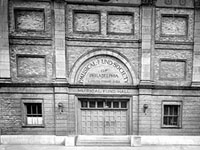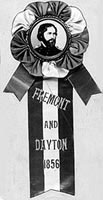What political party vowed to stop the spread of slavery to the territories?
Republican Philadelphia
GOP Convention of 1856 in Philadelphia
Republican Platform of 1856
![]()

Musical Fund Hall
Ominous talk of pending civil state of war was rampant, and there was a real feeling of national crisis when Republicans gathered to cull their first presidential candidate at Philadelphia's Musical Fund Hall in mid June.
Fierce civil conflict in "bleeding Kansas" was polarizing the nation. In fact, it was the appeasement of slave interests through the Kansas-Nebraska and Fugitive Slave acts that gave nascency to the party.
The new Republican Political party was born in 1854 at a coming together in Ripon, Wisconsin. Abolitionists and those opposed to extension of slavery gathered to protest the Kansas-Nebraska Human activity, which opened territory to slavery that had been forbidden by the former Missouri Compromise of 1820.
The new party was an umbrella that took in members of the speedily disintegrating Whig Party, abolitionists, Free-Soilers and anti-slavery Democrats.
It was certainly a regional party — a party of the North and the West. The Evening Message alleged it was "somewhat astonished" by the appearance at the convention of delegates from Kentucky, Delaware, Virginia and Due north Carolina. "Nosotros had supposed in accordance with the popular impression that there would exist no delegations from whatsoever southern or slave states."
The 3-day convention kicked off on June 17. The Message noted: "Our town is again live with the hurry and excitement of a thousand convention. The hotels are crowded to the highest flying with politicians of many shades."

James Buchanan: The Last Doughface
The Democrats had met earlier in Cincinnati, and subsequently 17 ballots selected Pennsylvanian James Buchanan as its standard-bearer. Buchanan, alleged a Richmond, Va., newspaper, "had never uttered a word which could pain the well-nigh sensitive Southern eye." The political party platform supported "pop sovereignty" for settling the question of slavery in new territories. And the party vowed to resist "in renewing in Congress or out of it, the agitation of the slavery question."
Prior to the Republican convention, city Democrats held a massive rally in front of Independence Hall on June 10. Illinois Sen. Stephen Douglas declared the nation was facing the most important election since 1800.
This was a theme heard constantly. The nation was in crisis; the election would make up one's mind the outcome. The Evening Bulletin alleged: "It has been correctly remarked that probably a more of import convention than the ane in question has non been assembled in our city, perchance not the land, since the days of 1776. The relations of the opposing political parties take aroused a gravity and importance hitherto unknown."
The convention's presiding officer Col. Henry Lane of Indiana declared, "We have assembled at the most important crisis in our post-revolutionary history."
Designed by renowned architect William Strickland, Musical Fund Hall on Locust Street near 8th opened in 1824. It was the site of the convention. It could seat 1,200; information technology'due south acoustics were infrequent. All the same, the year post-obit the GOP convention the concert hall was surpassed by the opening of the grand Academy of Music on Broad Street.
About 600 delegates attended the convention. More than than 100 paper reporters were seated at tables in the forepart of the auditorium.

"The Trail Blazer," John C. Fremont
The delegates got right downwards to business concern the first day by adopting a platform. The key plank was firm opposition to the extension of slavery. "It is the duty of Congress to prohibit in the territories those twin relics of barbarism, polygamy and slavery." The polygamy reference was aimed at the Mormon settlement in Utah territory.
So the talk turned to a presidential candidate. The names of Salmon P. Hunt of Ohio and U.S. Sen. William H. Seward of New York had been put forward prior to the convention. Both were strong anti-slavery men, both would become important members of Lincoln's cabinet, but neither seemed to accept the burning want or political backing to win the presidency in 1856.
Pennsylvania was solidly backside 71-yr-former U.South. Supreme Courtroom Justice John McLean, a cautious, bourgeois blazon with a long-standing desire to exist president. He didn't seem to be a true antislavery Republican just was popular with old Whigs and American "Know Nothing" nativists.

Fremont Campaign Pin
Without a incertitude, the human being with the strongest backing was 43-yr-old retired Army officer John C. Fremont. "The Trail Blazer" was a national hero for his v courageous crossings of the Rocky Mountains and his leadership role in wresting California from Mexico. He had served briefly as U.S. senator from California. Though born and raised in the South, Fremont opposed slavery. Mostly it was name recognition and non offending whatever of the political party factions that made Fremont the front-runner.
An breezy ballot on the get-go mean solar day showed Fremont with 369 delegates to McLean'southward 196. The formal ballot came the next day with Fremont pulling 530 votes to McLean'southward 37. "When the vote was appear a scene of the wildest disorder, the most enthusiast excitement and the most decided approbation followed," wrote a Bulletin reporter. There were nine thank you for Fremont, nine cheers for California, 9 for the union and a final 9 thank you for Kansas.

William Dayton
There was real contest for the office of vice president. Fifteen names were put frontwards in an informal election. The leading candidate was William L. Dayton, a former senator from New Bailiwick of jersey.
The Public Ledger reported: "A delegate from Illinois nominated Abraham Lincoln of Illinois. He would but say he was a proficient fellow, a firm friend of liberty and an old line Whig.
"Mr. Archer of Illinois spoke in favor of Mr. Lincoln, whom he had known since childhood and who was a pure patriot. He thought Lincoln would carry Illinois beyond a incertitude for Fremont; Illinois would be safe without him only doubly safe with him.

Abraham Lincoln
"Judge Spaulding wished to ask the question, `Tin Mr. Lincoln fight?'
"Archer: 'Yes sir, he is a son of Kentucky and a alpine human, whichever fashion you lot can set it.'"
The New York Times gave Archer'due south reply to the question a fleck differently: "Aye! Have I told you he was born in Kentucky? He'south strong mentally; he'southward potent physically. He'due south strong every way."
On the informal ballot, Lincoln received 110 votes to Dayton's 259. But in the formal vote, Dayton had it sewed up and Illinois withdrew Lincoln's proper name from consideration.
With the important business organisation done, the delegates and Republican supporters held a mass rally.
"On the outside of the hall and immense oversupply was gathered. The steps were transformed into a speakers platform and addresses delivered by various speakers," said the Bulletin.
Banners flew everywhere begetting the slogan: Free Speech. Free Printing. Free Soil. Free Men. Fremont and Victory." An anti-slavery branch of the American (Know Nothing) Party meeting in New York threw its support backside Fremont and Dayton.
The site of that kickoff Republican convention, Musical Fund Hall, still stands on Locust Street. It is listed on the National Register of Historic Places. After its demise equally a music hall, information technology served equally a union hall, basketball game arena and cigar warehouse. It stood empty and forlorn for most ii decades, dangerously deteriorated and threatened with demolition. Developers purchased the celebrated derelict in 1980 for $25,000 and restored it every bit an apartment firm.
GOP Convention of 1872 in Philadelphia >
Source: https://www.ushistory.org/gop/convention_1856.htm
0 Response to "What political party vowed to stop the spread of slavery to the territories?"
Post a Comment